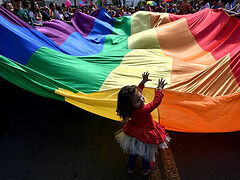Paphos, Paphos District, Cyprus, September 7, 2023
The new Metropolitan of Paphos of the Orthodox Church of Cyprus condemned the new comprehensive, compulsory sex education courses in a letter read in all churches of his diocese on Sunday, September 3.
The Cypriot government decided to implement the new programs in schools across the island beginning this academic year.
In his new encyclical, Metropolitan Tychikos of Paphos states the according to the testimony of parents whose children took last year’s course on sex education, teachers said “unheard of and shameful” things and “made the children greatly embarrassed and uncomfortable.” The parents came to “understand what such an education is ultimately intended to do,” the Cypriot hierarch writes, reports the Orthodoxia News Agency.
According to Met. Tychikos, the new courses are “aimed at depriving our children of spiritual fortitude, blunting their moral sensibilities, and leveling the values of our 2,000-year-old Greek tradition and conscience.”
“The ultimate consequence of this Western and externally imposed ‘education’ will be that future generations will lose the most valuable legacy that was bequeathed to us by our ancient and precious Greek Orthodox tradition and preserved with countless bloody sacrifices of our ancestors, namely, our Greek conscience,” the Metropolitan continues.
And all this is being done “to make us vulnerable and easily controlled by the new order of things, which above all persecutes and hates Orthodox peoples,” he concludes.
The Ministry of Education released details of the curriculum in June:
Pre-school education
- Your body belongs to you
- Good and bad touches
- Good and bad secrets
- Prevention and protection of children as the responsibility of adults
- Reporting and disclosing information
- Known and unknown perpetrators
- Help – Safety Network with trusted individuals
- Knowing, caring for, and protecting oneself – Personal health and safety
- The power of friendship
- Family (relationships, roles, stereotypes)
- Human rights and obligations – Children’s rights and obligations
- Emotions (recognition, expression, empathy, control)
- Similarities and differences
- Cooperation
Primary Education
First Grade: Reproductive and private body parts, good and bad secrets, good and bad touches, safety network, reporting, underwear rule, European emergency number, friendship, healthy relationships, personal hygiene/body care, identity (habits, gender), emotions (recognition, expression, causes), friendship, respect.
Second Grade: Love, responsibility, risky behaviours, underwear rule, family, gender stereotypes, safety at home and school, reporting lines, similarities and differences between individuals, benefits of diversity.
Third Grade: Stages of personal development, techniques for managing difficult emotions, family life, protection against all forms of abuse, communication, deconstructing gender stereotypes, and gender equality.
Fourth Grade: Empathy, responsible and irresponsible behaviours, health, body image, sports and gender, online dangers, helplines, bullying, legislation on protection from sexual abuse, Commissioner for Children’s Rights, the role of the state in ensuring children’s rights.
Fifth Grade: Adolescence, self-image, cyberbullying, fake profiles, digital identity (self-image in digital media), healthy coexistence, stereotypes, anti-racism culture/racist speech, proper online behaviour, conflict resolution, healthy communication methods.
Sixth Grade: Smoking/alcohol, information/misinformation, exposure to illegal content, personal data, phishing, sexting, grooming, flirting, daydreaming, masturbation, menstruation, changes (physical, emotional, social), adolescence, emotional well-being.
Secondary Education
First Grade: Health: Concept of health, factors influencing health and individuals’ lifestyles, and their interaction. – Self: Importance of holistic self-development, protective factors and risk factors for self-development, ways to improve each dimension of oneself. – Adolescence: Changes during adolescence, coping with changes, defence mechanisms and protective practices, characteristics of healthy relationships within the family and friendship, healthy interpersonal relationships.
Second Grade: Personal development: Factors influencing positive development of self-dimensions (media, friendship, family). – Sexual and reproductive rights: Social stereotypes and acceptance of diversity. – Forms of violence: Sexual, physical, psychological, emotional, economic. – Existing legislation, bullying, zero tolerance for violence and bullying.
Third Grade: Characteristics of adolescence: Characteristics of sexual maturation, behaviours that promote adolescents’ sexual health, factors influencing sexual and reproductive health of adolescents. Healthy relationships, reproductive and sexual rights, human rights, sexual behaviour.
Technical Schools
First Grade: Self and identity formation during adolescence: Protective factors and risk factors influencing the development of self-dimensions. Healthy relationships, sexual and reproductive health and rights, rights and sexuality, physical health (STDs and contraception).
Second Grade: Personal development: Factors influencing positive development of self-dimensions (media, friendship, family). Sexual and reproductive rights: Without prejudice based on nationality, disability, sexual orientation, and gender identity. Forms of violence, existing legislation, bullying, zero tolerance for violence and bullying.
Third Grade: Healthy romantic/sexual relationships: Communication skills, active listening, negotiation, conflict resolution, self-control, and self-respect. Family formation, rights and ways of protecting vulnerable groups, ethical dilemmas, family planning, family education.
Follow OrthoChristian on Twitter, Vkontakte, Telegram, WhatsApp, MeWe, and Gab!




